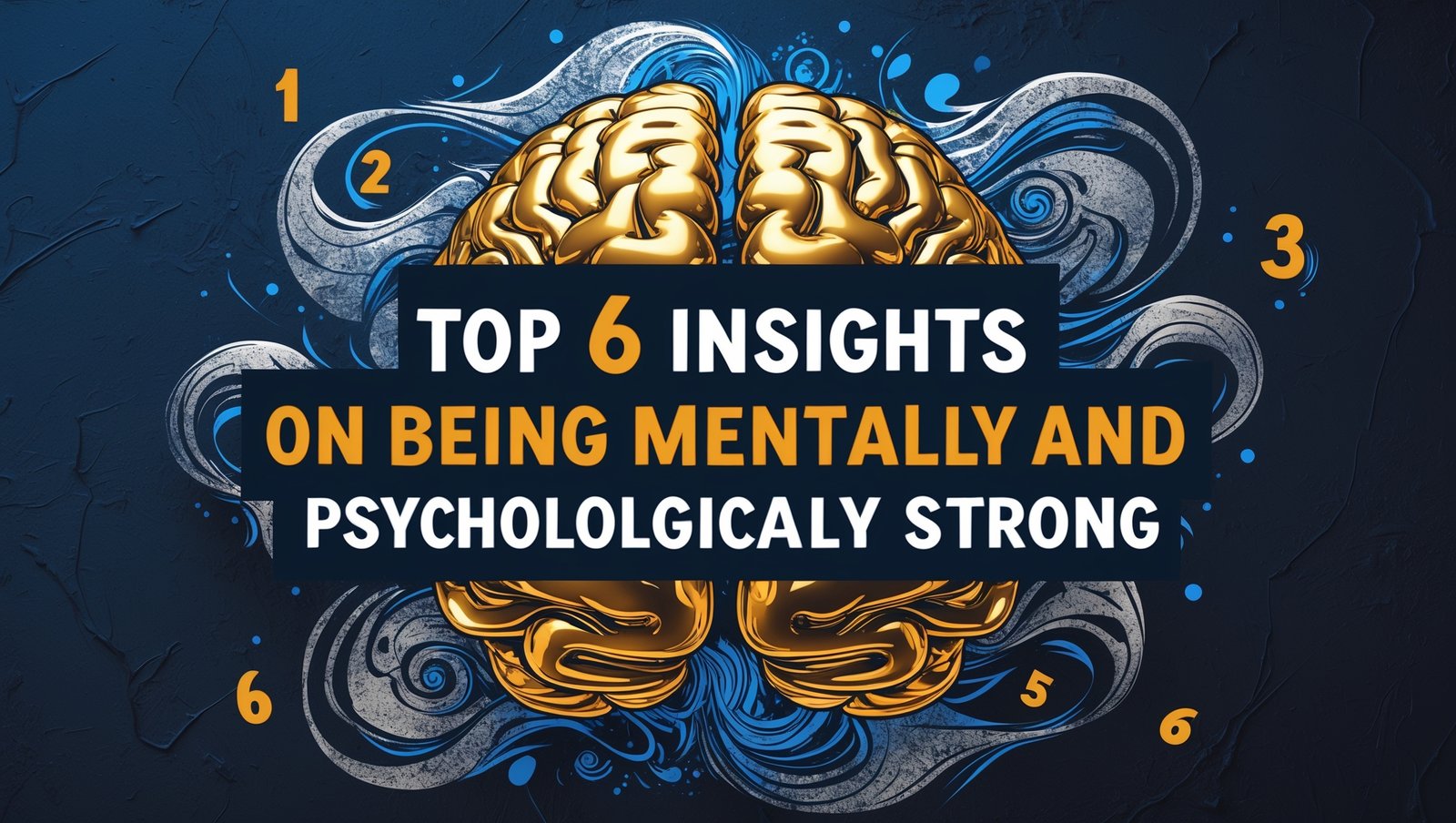In today’s fast-paced world, being mentally and psychologically strong is no longer a luxury but a necessity. Being mentally and psychologically strong allows you to handle stress, overcome challenges, and maintain emotional balance despite difficult circumstances. If you’re looking for ways to build a resilient mind and cultivate inner strength, this guide will offer you essential insights on how to be mentally and psychologically strong.

Table of Contents
1. Understanding Mental and Psychological Strength
What is Mental and Psychological Strength?
Being mentally and psychologically strong isn’t just about “toughing it out” during tough times. It is the ability to stay grounded, maintain clarity, and function at your best even when facing adversity. Mentally strong individuals possess the emotional resilience, adaptability, and mindset required to navigate life’s ups and downs effectively.

Psychological strength, on the other hand, refers to the mental toughness that helps individuals cope with stress, overcome setbacks, and bounce back from failures. It’s not about avoiding emotional pain but managing and responding to it in a way that fosters growth and recovery.
Why Is Mental Strength Important?
Mental strength plays a vital role in almost every aspect of your life. From personal growth to achieving professional success, your mental fortitude helps you:
- Overcome setbacks and challenges
- Build healthy relationships
- Make informed decisions
- Develop the confidence to pursue your dreams
- Handle stress in a healthy way
- Maintain a positive mindset during challenging times
2. Build Emotional Resilience
Emotional Resilience Defined
Emotional resilience refers to your ability to adapt and recover from emotional stress, disappointment, and adversity. It is about maintaining a sense of hope and control, even in the most overwhelming situations. Building emotional resilience is key to psychological strength because it allows you to weather storms without letting the stress take over.

How to Build Emotional Resilience
To develop emotional resilience, consider these practical strategies:
- Recognize Your Emotions: The first step to managing your emotions is recognizing them. Acknowledge your feelings without judgment, whether they’re negative or positive.
- Practice Self-Compassion: Be kind to yourself when things don’t go as planned. Self-compassion involves treating yourself with the same care and understanding you would offer a friend.
- Learn to Accept Change: Change is a constant in life. Those who are emotionally resilient embrace change, view challenges as opportunities for growth, and understand that setbacks are a natural part of life.
- Focus on What You Can Control: Instead of fixating on what’s out of your control, focus on the things you can manage. This will help you feel empowered and prevent feelings of helplessness.
3. Cultivate a Growth Mindset
The Power of a Growth Mindset
A growth mindset refers to the belief that abilities and intelligence can be developed through effort, learning, and perseverance. Those with a growth mindset are more likely to embrace challenges, view failures as learning experiences, and continue to grow and improve, even when faced with adversity.

How to Develop a Growth Mindset
Shifting from a fixed mindset to a growth mindset involves:
- Embrace Challenges: Rather than avoid challenges, see them as opportunities to learn and grow. Each challenge is a stepping stone toward developing greater resilience and mental strength.
- Learn from Feedback: Instead of taking feedback personally, use it as a tool for self-improvement. Be open to constructive criticism and see it as a way to enhance your abilities.
- Focus on Effort, Not Results: Instead of placing your self-worth on outcomes, focus on the process and the effort you put into achieving your goals. Celebrate small wins along the way.
- Avoid Negative Self-Talk: Challenge negative thoughts that tell you that you can’t improve or overcome challenges. Replace them with positive affirmations and a belief in your ability to grow.
4. Practice Mindfulness and Meditation
Why Mindfulness and Meditation Matter
Mindfulness is the practice of staying present and fully engaged in the current moment, while meditation is a mental exercise that promotes calm, clarity, and focus. Both practices have been proven to reduce stress, improve emotional regulation, and enhance mental strength.

How to Incorporate Mindfulness and Meditation into Your Life
- Start with Small Steps: Begin with short, daily mindfulness sessions of 5 to 10 minutes. Gradually extend the time as you become more comfortable.
- Focus on Your Breath: Use your breath as an anchor during meditation. Breathe slowly and focus on the sensation of each inhale and exhale.
- Be Present: Practice staying present in daily activities. Whether you’re eating, walking, or having a conversation, try to be fully engaged in what you’re doing without distractions.
- Use Guided Meditation: If you’re new to meditation, try using guided meditation apps or online videos that can help you stay focused and deepen your practice.
5. Maintain Physical Health for Mental Strength
Connection Between Physical and Mental Health
Your body and mind are deeply connected. Physical exercise doesn’t just improve your fitness; it also enhances your mood, reduces anxiety, and promotes cognitive function. Maintaining physical health is an essential part of building mental strength because it helps you feel more energized, confident, and capable.

How to Maintain Physical Health
- Exercise Regularly: Engage in activities that you enjoy, whether it’s running, yoga, cycling, or weight training. Aim for at least 30 minutes of exercise most days of the week.
- Eat a Balanced Diet: Nourish your body with a balanced diet that includes a variety of fruits, vegetables, lean proteins, and whole grains. Avoid excessive sugar, caffeine, and processed foods.
- Get Enough Sleep: Aim for 7 to 9 hours of quality sleep each night. Proper rest is essential for cognitive function, emotional regulation, and overall well-being.
- Practice Relaxation Techniques: Incorporate relaxation techniques like deep breathing, progressive muscle relaxation, or stretching to release tension and stress from your body.
6. Build a Strong Support System
The Importance of a Support System
No one is an island, and having a strong support system is vital for mental and psychological strength. A support system provides you with the emotional, social, and practical support needed to navigate life’s challenges.

How to Build a Strong Support System
- Foster Meaningful Relationships: Build deep and authentic relationships with family, friends, mentors, and colleagues who support and encourage you.
- Seek Professional Help When Needed: If you’re struggling with mental health issues, don’t hesitate to seek help from a therapist, counselor, or coach. Professional guidance can help you navigate emotional difficulties.
- Engage in Social Activities: Surround yourself with positive people who uplift you. Whether it’s joining a hobby group or participating in community events, building connections with others can strengthen your mental well-being.
- Offer Support to Others: Helping others can also reinforce your sense of purpose and build mutual support. Be there for your loved ones when they need help, and they will reciprocate when you need it most.
Conclusion
Being mentally and psychologically strong is about developing resilience, adapting to challenges, and cultivating a mindset that allows you to thrive even in adversity. By embracing emotional resilience, cultivating a growth mindset, practicing mindfulness, maintaining physical health, and building a strong support system, you can enhance your mental strength and improve your overall well-being.

Remember that mental strength is not something you’re born with; it’s something you develop over time through consistent effort and practice. So take these insights and start your journey toward becoming mentally and psychologically stronger today.
FAQs
- How can I improve my emotional resilience? Start by practicing self-compassion, accepting change, and focusing on what you can control.
- What is the importance of a growth mindset in building mental strength? A growth mindset helps you embrace challenges and view failures as learning opportunities, which are key to developing resilience.
- How long should I meditate to build mental strength? Begin with 5 to 10 minutes daily and gradually extend the duration as you become more comfortable with the practice.
- Can physical health affect my mental strength? Yes, regular exercise, a balanced diet, and adequate sleep contribute to better mood, cognitive function, and emotional regulation.
- What role does a support system play in mental strength? A strong support system provides emotional, social, and practical support, helping you navigate life’s challenges with greater resilience.
- What is the importance of a growth mindset?
A growth mindset helps you stay mentally and psychologically resilient by embracing continuous improvement and self-belief.





